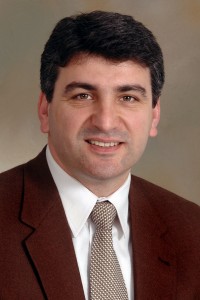
STONY BROOK, NY, July 29, 2011 — Apostolos K. Tassiopoulos, MD, associate professor of surgery, program director of the vascular surgery residency, and director of the Surgical Skills Center, has been appointed chief of the Division of Vascular Surgery [as of 2014, Division of Vascular and Endovascular Surgery] announced Todd K. Rosengart, MD, professor and chairman of surgery. Dr. Tassiopoulos has served as interim chief with distinction since 2008; he joined Stony Brook in 2006.
"The Division of Vascular Surgery has advanced considerably under Dr. Tassiopoulos' leadership," said Dr. Rosengart. "Notably the division has received international acclaim for their expertise in the area of venous disease, recently hosting an international conference attended by a 'standing room only' audience."
Comprised of five board-certified vascular surgeons, a PhD vascular physiologist, a non-invasive vascular technology specialist, two board-certified podiatric surgeons and a comprehensive clinical and administrative support staff, the Division of Vascular Surgery provides state-of-the-art evaluation and treatment of every aspect of arterial and venous pathology.
"The Stony Brook Division of Vascular Surgery has experienced a very significant growth over the past years," said Dr. Tassiopoulos. "Its members have a significant number of original scientific contributions and continuous presence in national and international vascular organizations and conferences. Through our collaboration with the Divisions of Cardiothoracic Surgery and Cardiovascular Medicine we have developed a comprehensive approach that offers state-of-the-art diagnosis and treatment to patients with arterial and venous disease in our community. Our goal is to continue expanding and refining our diagnostic and therapeutic capabilities over time and to provide the latest and most advanced treatment options for our patients."
The Division offers inpatient and outpatient services and performs an excess of 2,000 open and endovascular interventions annually, and oversees the vascular laboratory which performs more than 10,000 non-invasive diagnostic vascular studies each year. Vascular surgeons in the Division work collaboratively with the Divisions of Cardiothoracic Surgery and Cardiovascular Medicine for providing the best patient care and achieving optimal outcomes.
Dr. Tassiopoulos' role as the director of the Surgical Skills Center in the School of Medicine includes oversight of medical education in the 1,800 square-foot facility, which is dedicated to surgical training of fellows, residents and medical students. Embraced as a training tool and promoted as an assessment of resident surgical skills by the American College of Surgeons, surgical simulation is emerging nationwide as a resource with enormous potential for teaching, learning, and research.
"We focus on the development of surgical and clinical skills early on in the training process," said Dr. Tassiopoulos. "The Surgical Skills Center enables us to provide advanced levels of training to build surgical leadership skills and foster effective communication and collaboration between our medical students and the entire healthcare team. It is the most innovative resource available for providing critical assessment of patient safety issues and provides an excellent mechanism for developing and conveying best practices to our students."
The Division of Vascular Surgery offers a five-year vascular surgery residency, as well as a traditional two-year residency (fellowship), both of which are fully accredited by the Accreditation Council for Graduate Medical Education.
Dr. Tassiopoulos is board certified in both general surgery and vascular surgery. He has expertise in minimally invasive endovascular surgery for the management of aortic aneurysms (including treatment for thoracic aortic aneurysms), lower extremity vascular disease, carotid disease, and venous disease; minimally invasive percutaneous closure for varicose veins; and the treatment of spider veins (laser and sclerotherapy). He also specializes in surgical intervention for stroke prevention (carotid endarterectomy), aortic aneurysms, lower extremity vascular reconstruction, and dialysis access.
Dr. Tassiopoulos received his MD from Aristotle University Medical School in Thessaloniki, Greece, in 1989. He subsequently served for two years as a general medical officer in the Hellenic Air Force of Greece. In 1992, he moved to Houston, TX, to pursue a one-year postdoctoral fellowship in cardiovascular surgery at Baylor College of Medicine with Drs. E. Stanley Crawford and Joseph Coselli. He then completed his residency training in general surgery at SUNY Upstate Medical University in 1999, and went on to complete his training in vascular surgery at Loyola University.
An active scholar as well as a dedicated clinician, Dr. Tassiopoulos is the author of numerous peer-reviewed articles and book chapters. While training in general surgery, he devoted a year to basic science research related to the development of pulmonary complications following aortic surgery. During his vascular fellowship, his basic science research focused on developing strategies to prevent neo-intimal hyperplasia after various open and percutaneous vascular interventions. At the same time he worked on a number of clinical research projects in the diagnosis and pathogenesis of chronic venous insufficiency. At Stony Brook, he continues to develop his clinical research activity in venous disease.
